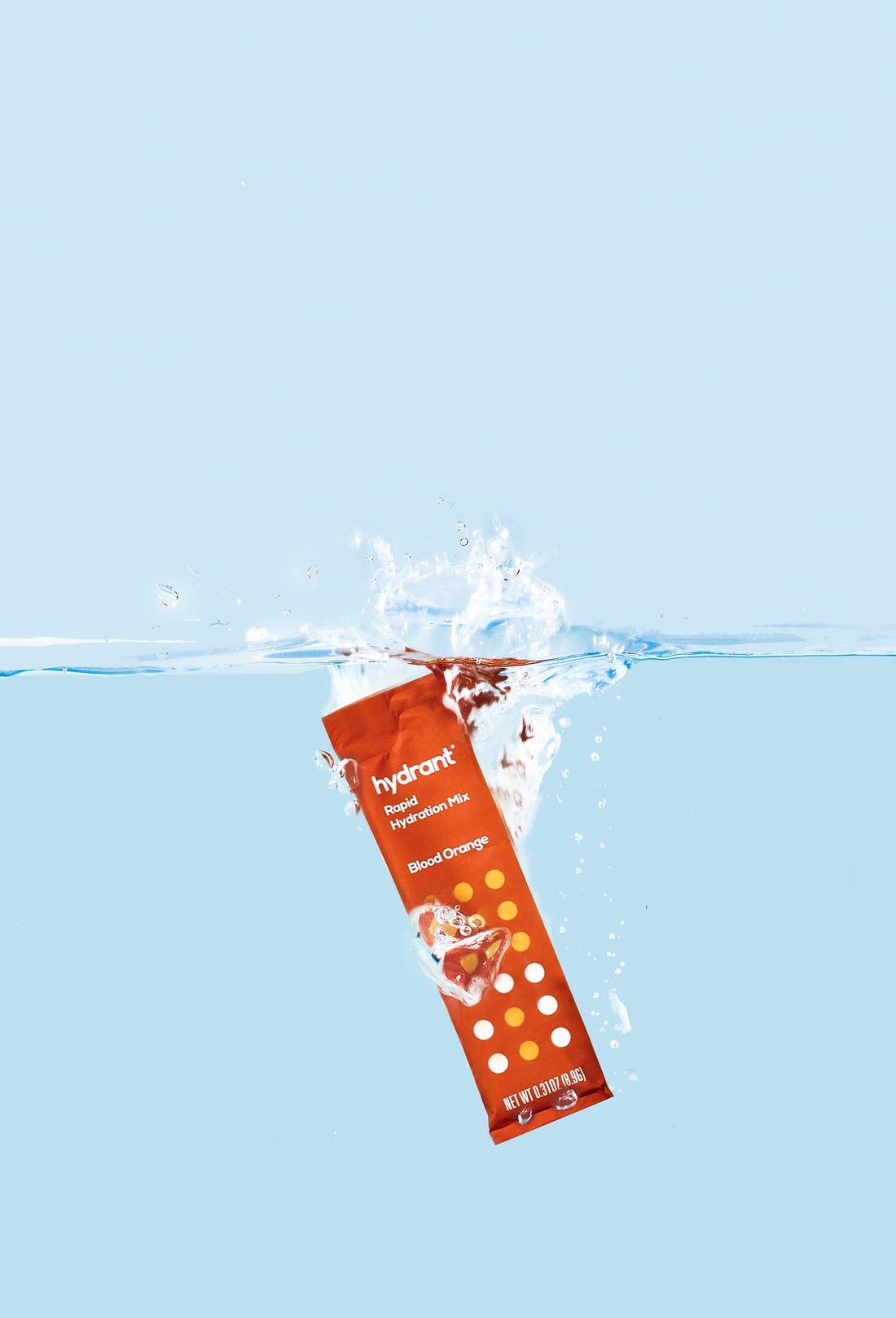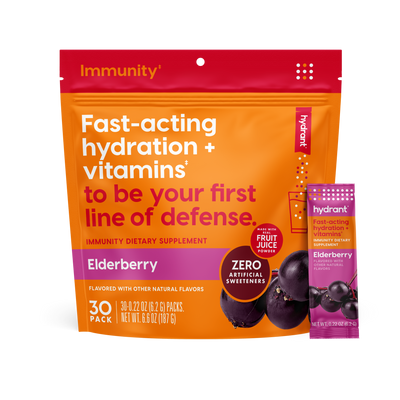Construction workers are involved in physically demanding work that can quickly dehydrate the body—especially during standard 8-hour shifts on warm Spring or Summer days. The apparel that construction workers wear is an additional catalyst for dehydration as protective gear such as long pants and vests are the norm.
When construction workers achieve proper hydration, they’ll be comfortable, healthy, and more productive overall. We’re here to lay out the best ways for construction workers to keep their bodies hydrated, so a day’s worth of work doesn’t take too much of a toll.
To understand how construction workers can stay hydrated, let’s take a look at how the body handles heat.

How Do Our Bodies Respond to Heat?
Our bodies work to maintain a consistent internal temperature. When we’re exposed to excess heat, our bodies respond by activating our sweat glands and switching blood circulation rates.
While sweating is a healthy response to high heat temperatures, it’s not enough to effectively cool the body as the moisture needs to exit our skin through evaporation. Heavy protective clothing that construction workers wear and high humidity are two elements that hinder sweat evaporation.
The amount of water construction workers can quickly lose through sweat is worth noting as two hours of standard work can lead to the beginning of heat stress. If initial heat stress signs are ignored, fatigue can set in before the third, and the final stage of heat stress occurs, resulting in a person collapsing.
Hydration is key in avoiding the uncomfortable and, at times, scary results of heat stress.
Now that we’ve covered some necessary information on how our bodies react to heat, it’s time to deconstruct some myths regarding heat stress.
What Are Some Myths About Heat Stress?
We’ve all felt the effects of heat stress at one point or another in our lives. If heat stress goes without proper treatment, a heat stroke can occur.
Myth #1: Heat Stroke Victims Don’t Sweat
One misconception about heat strokes is that a person experiencing a heat stroke won’t produce sweat.
Here are the signs of a heat stroke:
- Confusion
- Unconsciousness
- Seizures
- High body temperatures
If you witness a person experiencing any of the above symptoms, it’s essential to get them immediate medical attention, whether they’re sweating or not.
Myth #2: Medications Don’t Affect A Person’s Ability to Handle the Heat
Workers with prescriptions should consult their doctors on how to balance their medication with their work life. Specific drugs can produce adverse effects when the person exposes themselves to high levels of heat.
An example of an adverse medication effect in heat can include the body having a reduced ability to cool down.
Myth #3: Salt Tablets Are a Great Solution for Restoring Electrolytes
Salt tablets should only be used under the instruction of a medical professional. The average person can replenish their electrolytes through a healthy balance of meals, snacks, and hydrating fluids. Too much salt in a person’s system can cause vomiting, a reaction that will only serve to worsen dehydration.
Let’s cut to the chase and provide some quick tips for how construction workers can stay hydrated.
What Are Some Quick Tips for Construction Workers to Stay Hydrated?

How you go about maintaining proper fluid levels is going to be the difference-maker for construction workers. Drinking water before you start working is just as important as drinking water during your day. Before you begin construction work, drink two cups of hydrating fluid, then a cup every 20 minutes on average during your day. We understand that you’re probably not able to take breaks every 20 minutes to hydrate, so we recommend carrying a portable water bottle for easy fluid access during work.
People often make the mistake of only hydrating when they feel thirsty. Dehydration can begin to take effect before you get the urge to drink fluids, so it’s helpful to remain ahead of the curve by hydrating before you work along with regularly scheduled breaks through your shift.
There are certain types of drinks construction workers should avoid as their consumption dehydrates the body. Feel free to enjoy that sacred coffee or tea in the morning, but be sure to balance this out with plenty of hydrating fluids such as water. While movies and television may show construction workers attempting to cool off with a can of beer, alcohol consumption does not promote proper hydration.
It’s becoming more evident that preparedness is a crucial component of staying hydrated. Checking the forecast ahead of time and scanning for hot days is a great way to prepare for your working conditions.
What About Traditional Sports Drinks?
It’s not a horrible idea to consume sports drinks when working construction, but it is helpful to be aware of the sugar levels these types of popular drinks can contain. Your typical 12 oz. bottle of a traditional carb-based sports drink contains around 21 grams of sugar, which can lead to dehydration if consumed in excess amounts.
Even though sports drinks contain electrolyte replenishing capabilities, moderation is vital due to the sugar levels involved.
What Are Some On-Site Hydration Strategies for Construction Companies?
If you manage a construction site, accessibility to hydrating fluids is critical for helping your team stay healthy and productive. Large-size coolers are a reliable option for keeping construction workers hydrated.
Try and find a cooler that’s insulated and portable. Insulation coolers can keep hydrating fluids cold for hours on end. Maintaining a cool temperature with the fluids you provide on-site for workers will help make hydration more refreshing than warm liquids. Portability is vital when your team moves around to different locations within the job site.
Durability is the last key component of an effective construction site cooler due to the rugged nature of the job. Working in areas with dry dirt and dust can lead to liquid supply being contaminated, so be sure to check up on the cleanliness of your supply.
Below is a quick list of coolers that are popular on construction sites:
- Igloo
- Yeti
- Coleman
Be sure to stock up on cups if workers don’t have a portable water bottle readily available.
You’re probably wondering what the best hydration drinks are to fill your construction site cooler with. Before you go for water or sports drinks, consider using Hydrant.
How Does Hydrant Help Construction Workers?

Hydrant is a wellness brand that provides a refreshing drink mix designed to hydrate a person quickly. What makes Hydrant more efficient than water is that the blend contains the perfect balance of electrolytes and some sugar to rehydrate you fast & effectively.
You might ask why Hydrant contains any sugar at all.
The 7 grams or less of sugar that Hydrant mixes contain serve to activate the sodium-glucose transport mechanism in the small intestine. This pump pushes electrolytes and water into a person’s bloodstream faster. By working through an understanding of this internal mechanism, Hydrant can provide rapid absorption.
The low osmolality levels in Hydrant create fewer particles per volume that allow the mix to travel down the body’s osmotic gradient faster.
Earlier, we mention that it’s essential to hold cold liquids on a construction site to make hydration more appealing. Hydrant tastes best at cold temperatures and is made with real fruit juice powder to provide its light, refreshing flavor.
Feel free to visit The Hydration Institute to learn more about the science behind staying hydrated.













